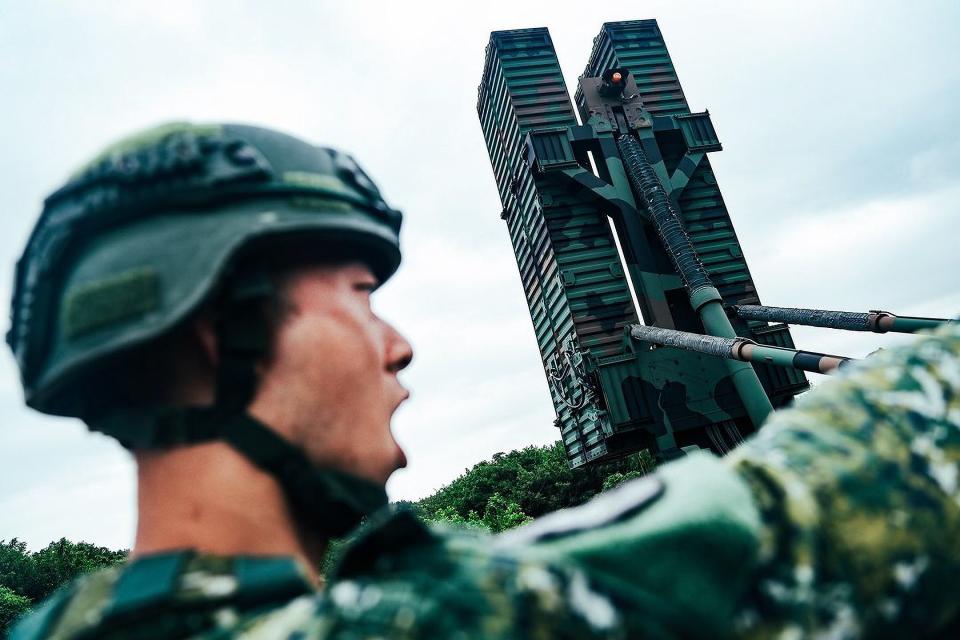China's military exercises last week 'looked like a rehearsal' for a Taiwan invasion, US' top officer in the Pacific says
- Oops!Something went wrong.Please try again later.
China's drills around Taiwan "looked like a rehearsal" for an invasion, a top admiral warned.
China surrounded Taiwan during the two-day exercises, demonstrating what an assault could look like.
The head of US Indo-Pacific Command said the US "took note" of the drills and "learned from it."
China's large-scale military exercises surrounding Taiwan last week "looked like a rehearsal" for an invasion, the US' top officer in the Pacific said.
The two-day drills, which included a fleet of nearly 50 ships and bombers that carried out mock attacks, came on the heels of the inauguration of Taiwan's new president and demonstrated what a Chinese blockade or quarantine of the island could look like should Beijing decide to take it by force.
Chinese state media said the exercises were focusing on "joint sea-air combat readiness patrols, joint seizure of comprehensive battlefield control, and joint precision strikes on key targets." CCTV footage showed simulated airstrikes with live missiles.
In the aftermath of the exercises, US lawmakers and officials have been responding with clear shows of support for Taiwan. On Wednesday, US Indo-Pacific Commander Adm. Samuel Paparo said the exercises "looked like a rehearsal" for an invasion, adding that the US had observed them closely.
"We watched it. We took note. We learned from it," he told Japan's Nikkei newspaper. "And they helped us prepare for the future."
Paparo, who assumed command earlier this month, added that the US and its allies had been prioritizing deterrence in the region in order to prevent a conflict between China and Taiwan from breaking out. He also called the US and Japan's relationship "the most important alliance on the planet," signaling the growing threats in the Indo-Pacific region and the US focus on security in the area. The US would be dependent on Japan's bases to threaten a Chinese threat to Taiwan, as President Joe Biden has vowed.
Other US officials echoed similar concerns. Earlier this week, US Rep. Michael McCaul said the exercises were a "preview of what a blockade could look like," and demonstrate what a response from Taiwan "and or possibly the United States" would be. While visiting Taiwan, McCaul also noted that US military aid packages are on their way and noted that maritime assets, such as Harpoon anti-ship missiles, will be a priority going forward.

Last week's exercises weren't the first time China has held provocative exercises around Taiwan. It's the third such event in three years; the first came after former US Speaker of the House Nancy Pelosi visited Taiwan in August 2022 and the second happened in April 2023.
The most recent drills appeared to focus on joint combat capabilities, and while Chinese-declared exercise zones only skirted the edge of Taiwan's claimed contiguous zone and territorial waters, the activity still put major pressure on Taiwan and gave China a chance to test how its forces would assault the island.
Prior to the exercises, China characterized them as a "strong punishment for the separatist acts of Taiwan's independence forces," as well as "a stern warning against the interference and provocation by external forces," such as the US and Japan.
The drills were also seen as a response to the historic election of the Democratic Progressive Party's Lai Ching-te, who served as the former vice president under Tsai Ing-wen. Lai is particularly disliked by Beijing, who has declared him a "dangerous separatist." Lai's inauguration speech also appeared to ruffle some feathers in Chinese leadership, as he plainly laid out how Taiwan "must demonstrate our resolution to defend our nation." China's leadership views the self-ruled democracy as a breakaway province.
China has long resolved to unify with Taiwan, repeatedly noting that it would prefer to do so peacefully but that force is on the table as an option. Such an event would likely involve some sort of blockade or quarantine, effectively cutting Taiwan off and raising a gray area where the US and its allies may be unsure of how to respond without escalating into full-scale war.
Read the original article on Business Insider

